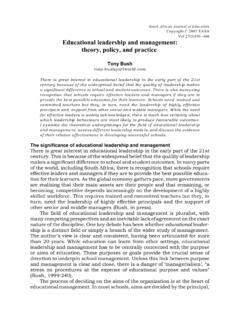Transcription of Positioning Young Black Boys for Educational Success
1 In this IssueAmerica is failing its Young Black boys. In metropolitan ghettos, rural villages and midsized townships across the country, schools have become holding tanks for populations of Black boys who have a statistically higher probability of walking the corridors of prison than the halls of college. Across America, the problem of Black male achievement seems intractable. We fail our Black sons more than any other racial or ethnic group. Volume 19, Number 3 policy Evaluation & Research CenterFall 2011 policy NOTESNews from the ETS policy Information CenterThe achievement gaps that exist today are an affront to a society committed to equal Educational opportunity and are a drag on the nation s economy, prosperity and competitiveness.
2 The large gap between Black males and others exists before these children start school and continues throughout their lifespan. This gap and the particular plight of Black males was the focus of two recent ETS conferences that are highlighted in this issue of ETS policy more recent conference, A Strong Start: Positioning Young Black Boys for Educational Success , convened in partnership with the Children s Defense Fund, took place at the National Press Club in Washington, , on June 14, 2011, and attracted more than 350 educators, researchers, practitioners and policymakers.
3 The conference focused attention on the nation s million Black males from birth to age nine. (continued on page 15)Addressing Achievement GapsPositioning Young Black Boys for Educational Success It is easier to build strong children than to repair broken men. Frederick Douglass2 The statistics are Nationally, graduation rates for Black teens teeter just under 50 percent. And in many large, urban school districts, more than half of Black males drop out of Black male achievement falls far below that of White and Asian boys.
4 Only 12 percent of Black fourth-grade boys are proficient in reading, compared to 38 percent of White boys. Only 12 percent of Black eighth-grade boys are proficient in math, compared to 44 percent of White boys. By fourth grade, Black students may be three full years behind their As we allow this underclass to grow, our society and our democracy is at risk. That is not meant as an overstatement, said ETS President and CEO Kurt Landgraf. It really must be the most challenging problem in American public education. Children are suffering from a toxic cocktail of poverty, illiteracy, racial discrimination and massive incarceration that sentences poor boys to dead-end and hopeless lives.
5 Marian Wright EdelmanThe reasons for this are pervasive. Children are suffering from a toxic cocktail of poverty, illiteracy, racial discrimination and massive incarceration that sentences poor boys to dead-end and hopeless lives, asserted Marian Wright Edelman, president and founder of the Children s Defense Fund (CDF). It is a community disaster. A national disaster. Black boys are always at the bottom of the totem pole. We are here to change that. Our goal today is to examine the challenges facing Young Black boys in America, said Michael Nettles, Senior Vice President of the policy Evaluation and Research Center at ETS.
6 We want to consider ways to position this very vulnerable population for Educational Success as early as possible in their Educational careers. The story for American Black boys can have a different ending if society focuses its efforts on their education and development, CDF s Edelman advised. Working together, we can explore the challenges facing this population and the opportunities to position Young Black boys to realize their potential. What is going on with our children is not an act of God, but of adult choice, lamented Edelman.
7 We can learn from what we know how to do. Edelman addressed the conference A Strong Start: Positioning Young Black Boys for Educational Success in Washington, , at the National Press Club, on June 14, 2011. The conference, co-sponsored by ETS and CDF, attracted more than 350 educators, researchers and policymakers to confront the crisis faced by million Black boys from birth to age nine, and to identify and highlight programs that are making a is the second in a series of conferences that ETS has organized to look specifically at the Black male achievement gap.
8 The first, Climbing the Academic Achievement Ladder: Promoting the Success of Black Males, also covered in this issue of ETS policy Notes, took place at ETS headquarters in Princeton, , on November 13, 2010. ETS co-sponsored the event with the New Jersey Department of Education and with support from the Metropolitan Center for Urban Education at NYU s Steinhardt School of Culture, Education, and Human Development, and the Center for Effective School Practices at Rutgers University. This issue of ETS policy Notes will weave together highlights from both conferences, examining the status of Black males in America as well as the important roles that families, schools, communities and public policy can play in improving this status.
9 All contribute to the perfect storm of Educational and economic negligence that society now must seek to counter. The focus begins with the earliest achievement gap noted at 9 months of age, and continues with innovative programs that may alter the achievement trajectory for these children. Finally, we will describe an important initiative on which CDF and ETS are collaborating that expands successful practice with ETS s support of a CDF Freedom School in Newark, In preparation for the June conference, data describing the rugged terrain that many Black males face during the course of their lives, from birth through death, are presented in A Strong Start: Positioning Young Black Boys for Educational Success : A Statistical Profile.
10 This publication is available at 2 Sharon Lewis et al., A Call for Change: The Social and Educational Factors Contributing to the Outcomes of Black Males in Urban Schools, Council of the Great City Schools, October and the Family Families are critical, said Oscar Barbarin III, the Hertz Endowed Chair in the Department of Psychology at Tulane University. Families establish a home environment and provide nurturing for children. Parents create connectivity, Barbarin said, by exposing children to varied experiences, expanding their knowledge and providing the interpretive framework for their ongoing learning.

















